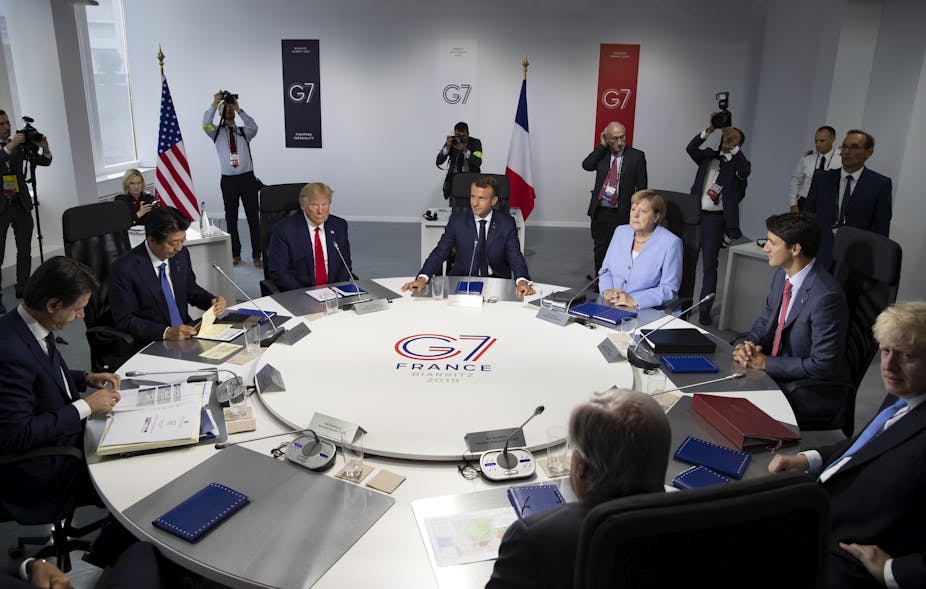Unlike the last G7 summit in Canada, the group’s 2019 meeting in Biarritz was not a disaster. The host, French president, Emmanuel Macron, displayed considerable diplomatic skill in managing the sensitivities of his American counterpart, Donald Trump. In particular, Macron helped to lay the ground for a possible meeting between Trump and the Iranian president, Hassan Rouhani, over the Iranian nuclear accord from which the US president withdrew in 2018.
But it’s doubtful whether in the longer term, the Biarritz summit will leave a visible mark on international affairs. Effective multilateral co-operation – the adoption and implementation of joint decisions by independent states – is rare and has become even more so in the past two decades.
Launched in the mid-1970s as Franco-German initiative in response to economic crisis, the G7 was a late addition to the edifice of international political co-operation that was constructed after 1945 in the wake of the 20th century’s two world wars. Owing, however, to the Cold War, effective multilateral co-operation was limited to the Western, democratic-capitalist world, and underwritten by that world’s undisputed leader, the US.
A chance missed
It was only briefly, in the early 1990s, as communism collapsed in central and eastern Europe and the Cold War ended, that a new era of genuinely global multilateral co-operation seemed politically feasible. Russia joined to make the group eight in 1998.
This moment, however, passed very quickly. Rather than transforming into capitalist liberal democracies, as some optimistic intellectuals expected, Russia reverted towards authoritarian nationalism and China, while making a transition to capitalism, experienced a consolidation of communist rule. Russia’s membership was suspended in 2014 following its annexation of Crimea.
There may have been a short period during which the US, as the primary victor of the Cold War, could have tried to orchestrate and launch a new era of multilateral international co-operation. Owing not least to the efforts of the US and the European Union, the 1990s did witness a renaissance of effective multilateralism, albeit a brief one. The primary manifestation of this was the successful conclusion in 1992 of the Uruguay Round of talks, which created the World Trade Organization (WTO) and boosted international trade.
At the same time, in Europe, the Maastricht Treaty of 1992 launched a new phase of more intensive political integration. Following the European example, states in numerous other regions began to discuss ambitious plans for closer regional co-operation.
Just over two decades on, the “system” of multilateral international co-operation either lies in ruins or, where vestiges of it, such as the WTO survive, these now look extremely fragile.

Road to retreat
First, the US invasion of Iraq in 2003 showed that the chief architect of the multilateral system, the US, when push came to shove, would not be bound by its rules. This shattered other states’ confidence in the system – at least in its military aspects.
Second, with the rapid economic growth of many other large countries, notably but not only China, the international distribution of power has shifted to become more dispersed. The interests of more states must be accommodated to mediate international economic conflicts. So, whereas the Uruguay Round could still be negotiated largely between the US and the EU, far more states had an effective power of veto over the subsequent Doha Round of talks – which ultimately therefore collapsed.
The final reason why international multilateralism is in retreat lies in the growing ideological and political polarisation both within and between key states. This process divides not only China and Vladimir Putin’s Russia from the West, but also, increasingly, the major Western powers from each other.
When the G7 began in the 1970s, all the major Western economies were governed by internationalist political leaders of the moderate right or moderate left, whose conflicts were susceptible to mediation. They were able, for example, to agree on a co-ordinated policy of international economic stimulus in the late 1970s.
Nothing of this kind could be expected of the G7 today. The growth of national populism, as illustrated by Trump’s election as US president and, in the UK, by the Brexit referendum vote and Boris Johnson’s rise to the premiership, has dramatically increased ideological and political divergences in the G7. By its very nature, national populism is fundamentally hostile to multilateral international co-operation.
Of all the world’s regions, western Europe has long been the primary exponent and champion of effective multilateral co-operation. More than anything else, the trials and tribulations of the EU during the past decade, with its growing signs of political disintegration, bear witness to the declining political feasibility of effective multilateralism. If this cannot succeed in Europe, then where?
The Biarritz summit will doubtless boost Macron’s domestic standing. How durable this boost will prove, as France begins to debate his proposed pension system reform, is another question. And it’s unlikely the summit will reverse the trend for G7 meetings to become increasingly irrelevant.
Meanwhile, international relations are likely to be governed increasingly by the principle of “might is right” – and one can only shudder as to the prospective probable consequences.

